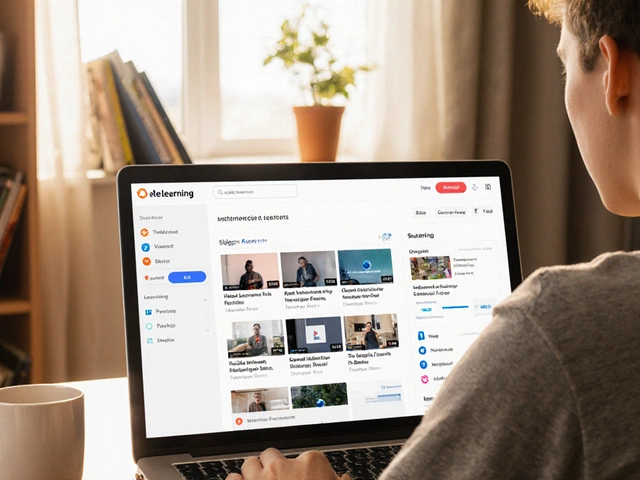So, you're thinking about diving into the world of coding? That's awesome! But how long will coding school actually take? Well, it’s not a one-size-fits-all scenario. Some folks get it done in a couple of months, while others take their time over a year or two, depending on their pace and life commitments.
If you're eyeing a full-time bootcamp, expect to dedicate about 9 to 12 weeks of intense study. These programs are designed to equip you with the essentials in a short period. They’re an all-in kind of deal, but they get you coding quickly.
For those balancing work or other responsibilities, part-time programs can span six months or more. They might take longer, but offer flexibility and allow you to absorb the material without the added stress of a jam-packed schedule. Plus, with online options, you can fit learning around your life, not the other way around.
- Introduction to Coding School Length
- Factors That Influence Coding School Duration
- Comparing Short and Long Programs
- Full-Time vs Part-Time Coding Schools
- Tips for Choosing the Right Duration
- Conclusion: Crafting Your Learning Path
Introduction to Coding School Length
Let's cut to the chase: how long is coding school, really? Well, there’s a whole spectrum of options out there, and the term "coding school" can mean different things to different people. Whether you're opting for a quick bootcamp or a more extended program, your choice will depend on your personal goals and circumstances.
Coding classes differ in length based on their format—intensive bootcamps typically run from 9 to 12 weeks, getting you up to speed quickly. Designed for fast learning, these programs pack a punch but demand time and dedication.
On the flip side, some programs stretch over six months to a year, especially if they're offered part-time. These longer durations allow for a more gradual learning curve and are perfect for those juggling other commitments like work or family.
Ever considered that the mode of learning—whether on-campus or online—can also affect the programming duration? Online courses often offer more flexibility, meaning the end point could come sooner or later depending on your pace.
Also worth mentioning is that many professionals argue whether hours spent coding outside of class are the true measure of learning speed. So, while official programs might last a few months, hours you put in can stretch beyond that.
| Program Type | Duration |
|---|---|
| Full-Time Bootcamp | 9-12 Weeks |
| Part-Time Bootcamp | 6-9 Months |
| Online Courses | Flexible |
The key takeaway? Whether it's a few months or a year, the time at a coding school is just the starting point for a journey in tech. The skills you gain are the real prize. And remember, the timeline is just a guideline; the real magic happens with the effort you decide to invest.
Factors That Influence Coding School Duration
Choosing the right length of a coding school program can be a bit tricky. Not only do you have to consider how much time you can commit, but there are also other key factors that play a role in determining how long you'll be hitting the books.
Coding school durations can be influenced by a variety of things, including:
- Program Format: The most obvious difference is between full-time and part-time programs. Full-time bootcamps are short and intense, running around 9 to 12 weeks, while part-time courses stretch over a few months, giving you more breathing room to learn.
- Learning Goals: Are you looking to land a job quickly or are you more interested in a deep dive into programming? The end goal often defines whether a shorter or longer course is suitable. If you're after a career shift fast, those full-timers are the way to go.
- Prior Experience: Some programs cater specifically to complete newbies while others assume a basic knowledge of programming. If you're starting from scratch, a longer program might be necessary to cover the fundamentals thoroughly.
- Curriculum Breadth: Certain coding classes offer a broader range of subjects including web development, data science, and even app creation. The more comprehensive the curriculum, the longer the course usually is.
- Support and Resources: How much mentorship, tutoring, or community support the school offers can affect how quickly you progress. Programs with lots of support might help you get through quicker by solving doubts or guiding projects more effectively.
- Technology Chosen: Learning certain coding languages and technologies can take longer than others. For instance, picking up Python for data science might have a different timeline than mastering full-stack JavaScript.
Understanding these factors can really help you pick the right coding classes that fit your personal needs. Everyone has a unique journey, so take the time to think about what works best for your lifestyle, goals, and existing skills.
Comparing Short and Long Programs
When it comes to coding school, you’ve got options — short, intensive bootcamps and longer, more detailed courses. But how do you know which is right for you? Well, let's break it down.
Short programs, usually known as coding bootcamps, are like the express trains of the learning world. They typically last anywhere from 9 to 12 weeks. They're laser-focused, teaching you the fundamentals and getting you ready to code quickly. These programs might be ideal if you're looking to make a fast career switch or have some tech background and want to upskill.
However, the trade-off is their intensity. Expect to be coding, breathing, and practically dreaming in code. Here’s a peek at an average bootcamp schedule:
- Daily Coding: 8 hours
- Weekly Projects: 1-2
- Lectures and Group Work: Regular sessions
On the flip side, long programs stretch over six months to a year or even longer. They usually offer more extensive curriculum and greater flexibility. Perfect for those who want to deeply understand programming without quitting their day job or getting overwhelmed by a compressed schedule.
The big perk here? You get a more balanced learning atmosphere. Here’s what you might expect:
- Weekly Coding: 10-20 hours
- Ongoing Support: Mentorship and peer reviews
- Comprehensive Curriculum: Covering both theory and practice
Either way, it’s crucial to choose a program that aligns with your lifestyle and learning goals. Don’t just go for the one that sounds fancy; consider what fits your needs and future plans best.
Statistics Show:
| Program Type | Average Duration (Weeks) | Average Job Placement Rate |
|---|---|---|
| Short Program | 9-12 | 85% |
| Long Program | 24-52 | 78% |
There you have it. Whether short or long, each has its benefits and challenges. The goal is to make your coding journey smooth, informed, and successful.

Full-Time vs Part-Time Coding Schools
Deciding between a full-time and part-time coding school mostly boils down to your lifestyle and learning goals. Both have their perks, but they cater to different types of learners.
Full-Time Coding Schools are perfect if you can put everything on hold and dive deep into coding. These courses typically cram a lot into a few months, like 9 to 12 weeks. You're looking at full days, often 40-50 hours a week, just like a job. The fast pace means you finish quickly, which could be beneficial for those eager to switch careers ASAP.
On the flip side, Part-Time Coding Schools let you balance other commitments. Typically spread over 6-9 months, these programs require fewer hours per week, often around 10-20. This schedule is great if you're working or have other responsibilities. You might miss that immersive feel of full-time programs, but the flexibility helps keep life on track.
Here's a quick comparison to consider:
| Schedule Type | Duration | Weekly Hours | Best For |
|---|---|---|---|
| Full-Time | 9-12 weeks | 40-50 hours | Career Changers |
| Part-Time | 6-9 months | 10-20 hours | Working Professionals |
When choosing, think about your current commitments and learning speed. Are you ready to switch gears entirely and learn to code like it's your new full-time job, or do you need more time to learn alongside other responsibilities?
No matter which path you choose, the key is diligence and staying committed to the process. Both routes require dedication, so choose the one that aligns with your life and goals.
Tips for Choosing the Right Duration
Picking the right duration for a coding school program is all about matching your goals with your current lifestyle. Here are some things to think about when making your choice.
First, identify your short-term and long-term goals. If you’re planning to switch careers quickly, a full-time bootcamp might be your best bet. These are intensive and short, usually between 9 to 12 weeks. They work if you can fully commit without distractions.
If you have a job or other responsibilities, a part-time program might suit you better. These span several months and allow you to learn at a more manageable pace. The flexibility here means you can balance school, work, and personal life.
Consider your learning style too. Some people thrive under intense, focused pressure, while others need time to absorb information. Reflect on past learning experiences to understand what works best for you.
It's also key to research different programs. Look at alumni reviews, job placement rates, and curriculum details to make sure the program aligns with industry demands. You could even reach out to graduates on LinkedIn to get their take on the duration and its impact.
| Type | Duration | Ideal For |
|---|---|---|
| Full-Time Bootcamp | 9-12 weeks | Career changers who can commit full-time |
| Part-Time Program | 6+ months | Those needing flexibility or learning alongside a job |
Finally, evaluate your financial situation. Intensive programs usually cost more up front but can lead to quicker employment. Longer programs offer payment flexibility but might stretch out costs over time.
Matching your personal situation with the right school duration can make all the difference in your success and satisfaction in the coding classes you choose.
Conclusion: Crafting Your Learning Path
Choosing how long to spend in coding school depends on a mix of your personal commitments and your career ambitions. Whether you opt for a full-time bootcamp or a more drawn-out part-time program, the key is to align your learning path with your own goals and lifestyle.
If you're in a rush to break into the tech field, those intense 9-to-12-week programs might be your best bet. They’re filled with late nights and lots of coffee, but the payoff is a fast track to a new career. These programs often boast a high percentage of graduates finding jobs shortly after completion, thanks to their alignment with industry demands.
On the flip side, if you need to juggle other responsibilities, a part-time or self-paced course makes a lot of sense. Spreading your learning over several months might seem slow, but it allows deeper concept retention and less burnout.
Whatever you decide, it's crucial to supplement coding school with real-world practice. Building projects, joining hackathons, and collaborating with other learners can boost your skills and confidence. Here’s a simple checklist to follow while crafting your path:
- Assess your current commitments and career goals.
- Choose a program that balances intensity and flexibility.
- Stay consistent in your practice, even post-coding school.
- Engage with coding communities for support and networking.
Remember, learning to code is a marathon, not a sprint. It’s more about persistence and practice than the number of weeks spent in coding classes. Take your time, enjoy the process, and soon you'll be writing code like a pro.










0 Comments